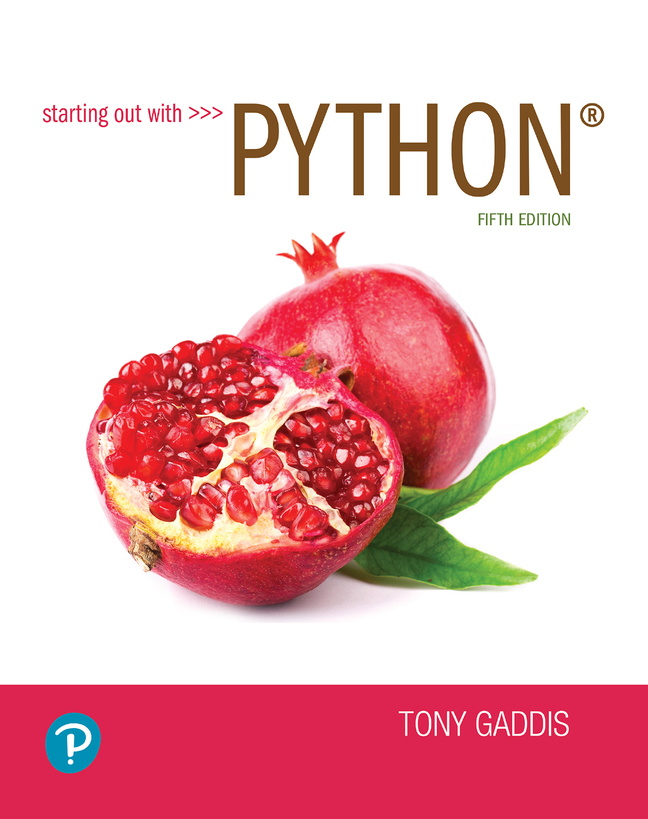
Starting Out with Python, 5th edition
Author: Tony Gaddis
Publisher: Pearson (March 13, 2020) - Copyright © 2020
ISBN: Multiple ISBNs available
Glendale Community College - Spring-2022 Semester
CS/IS 151 - PYTHON PROGRAMMING
Course Description:
CS/IS
151 is a course in programming computers in the Python language for those who
plan to be programmers or those interested in graphics and Graphical User
Interface (GUI) programming. Python is used in both business and game
applications. The course covers the basics of the Python language and reviews
computer science concepts. Data types, decision structures, loops, functions,
object-oriented programming, and some basic graphics and GUI concepts will be
presented.
Prerequisites:
None
Recommended Preparation:
CS/IS 112 or equivalent.
Schedule:
| Ticket | Time | Day | Instructor | Room |
|---|---|---|---|---|
| 1136 | Online | Online | Zare Agazaryan | Online |
This is an online course and all students are required to participate actively in online discussions and to use resources available on Canvas. All programming assignments have to be submitted via HyperGrade (Course Code: 10584).
| Textbook: | |
 |
Starting Out with Python, 5th edition Author: Tony Gaddis Publisher: Pearson (March 13, 2020) - Copyright © 2020 ISBN: Multiple ISBNs available |
Course Overview (in Adobe Acrobat .PDF format)
| Lecture Notes | |
| Microsoft PowerPoint (PPTX) Format | Chapter Title |
| Chapter 01 (PPTX) | Chapter 1. Introduction to Computers and Programming |
| Chapter 02 (PPTX) | Chapter 2. Input, Processing, and Output |
| Chapter 03 (PPTX) | Chapter 3. Decision Structures and Boolean Logic |
| Chapter 04 (PPTX) | Chapter 4. Repetition Structures |
| Chapter 05 (PPTX) | Chapter 5. Functions |
| Chapter 06 (PPTX) | Chapter 6. Files and Exceptions |
| Chapter 07 (PPTX) | Chapter 7. Lists and Tuples |
| Chapter 08 (PPTX) | Chapter 8. More About Strings |
| Chapter 09 (PPTX) | Chapter 9. Dictionaries and Sets |
| Chapter 10 (PPTX) | Chapter 10. Classes and Object-Oriented Programming |
| Chapter 11 (PPTX) | Chapter 11. Inheritance |
| Chapter 12 (PPTX) | Chapter 12. Recursion |
| Chapter 13 (PPTX) | Chapter 13. GUI Programming |
| Chapter 14 (PPTX) | Chapter 14. Database Programming |
| All Lecture PowerPoint Notes in a single ZIP file | |
| Submission Instructions |
| Project and Homework Assignment Submission Instructions |
| Tests | Date | Topics Review |
| Midterm Exam |
TBD |
Midterm Topics |
| Final Exam | TBD | Final Topics |
|
Make-up Policy: There are no make-ups on examinations, homework, etc. All students are required to take the midterm and final exams in order to pass the class. If a student can’t be present in the classroom for taking a written exam, the student is required to make arrangements with the instructor at least two weeks prior to the exam date. Late assignments will not be accepted. |
||
| Resources |
| Source Code from Textbook |
| Python – Official Website |
| Python Visualizer |
| Python Tutorial |
First Day Drop Policy:
I reserve the right to drop no-shows after the first hour of the first
class if no prior arrangements were made for the absence.
Disabled Students:
All students with disabilities requiring accommodations are responsible
for making arrangements in a timely manner through the Center for Students with
Disabilities.
Class Rules:
Electronic Device Policy: Turn off cell phones before entering class. No
texting, no calls, no checking messages, etc.—do that during the break. Use of
recorders (audio and/or video) is allowed with instructor permission. No eating
or drinking in class. Clean your area before leaving—throw away all trash.
Please do not put backpacks, purses, etc. in the aisle where people may trip
over them.
Academic Honesty Policy:
I follow the Glendale Community College Honesty Policy as listed in the
Glendale Community College Catalog and the Student Handbook (free at Information
Desk near Admissions). Students are, at all times, required to do their own
work. No copying of other students’ work, whether on a test or on routine class
work, is allowed at any time. Activities that are considered to be CHEATING
include, but are not limited to, the following: talking during exams (including
answering another student’s questions), using cell phone during exams, using
computer (unless permitted), using notes or textbook (unless permitted), using
or passing notes or sharing work—written or electronic—to or from another
student, writing notes on desk for use during exam, copying other students’
work—homework, classwork, or exams, and so on. Violation of any of these rules
(i.e. cheating) could result in a lowering of the exam grade or the course grade
(e.g. a “Fail”), and the violator’s name and student I.D. number will be sent,
with a description of the violation, to the Division Chair and to the Vice
President of Instruction to be kept on record for future reference. The Dean of
Student Activities may also be contacted for disciplinary action, if necessary.
ISSUES OR COMPLAINTS
Please address any issues you may have that are relative to this course
with me, your instructor, before or after class in person, or during my office
hours (see above), by e-mail, or by telephone as early in the semester as
possible. If you and I cannot resolve the issue, I will refer you to the
assistant chair,
Rory Schlueter.